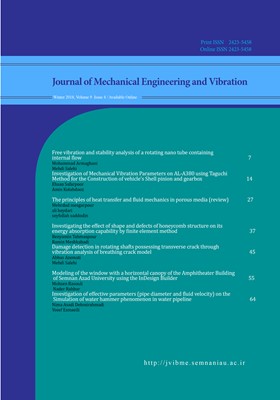A review of energy efficiency in buildings by phase change materials and intelligent management system
Subject Areas : Fluid Mechanicmehdi abdoos 1 , Abdollah Khalesi Doost 2 * , Hadi Kargar Sharifabad 3
1 - دانشگاه آزاد اسلامی واحد سمنان
2 - Energy and Sustainable Development Research Center, Semnan Branch, Islamic Azad University, Semnan, Iran
3 - Energy and Sustainable Development Research Center, Semnan Branch, Islamic Azad University, Semnan, Iran
Keywords: Energy efficiency, Keywords, Insulation, Phase change material, Heat loss, Intelligent management system,
Abstract :
One of the most important issues in the world today is energy saving, which in the construction industry, proper thermal insulation is one of the solutions to prevent energy loss. Also, the use of new and suitable insulation materials helps us to achieve this. Energy crisis, global warming and other environmental issues have always been the main motivation for researchers and engineers to look for new ways to reduce building energy consumption. Recently, the use of phase change materials to increase the thermal mass of the building has received much attention. Phase changers are organic or inorganic compounds that have the ability to absorb and store large amounts of heat energy within themselves. Due to this unique feature, using these materials can naturally delay the transfer of heat to the building for several hours during peak hours of energy consumption and therefore closer to the goal of optimizing energy consumption in the building. The use of phase change materials in the construction industry along with the proper use of the capabilities and physical properties of materials, was introduced in the world several decades ago and is now known in developed countries, while in our country the research and application of these materials in the construction industry remains almost unknown. The purpose of this article is to introduce and provide suggestions for using phase change materials to store and reduce energy consumption in the building.
_||_

